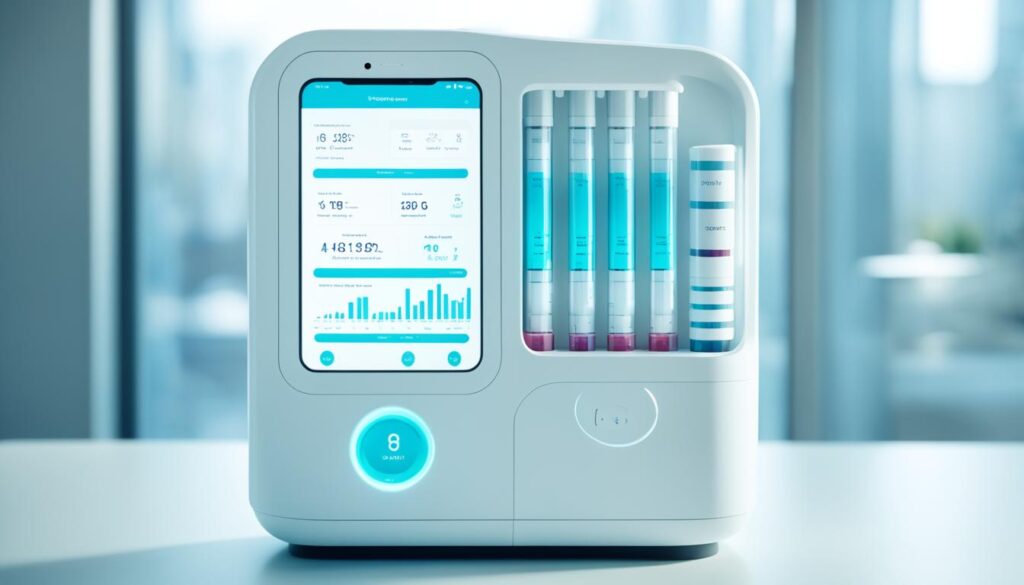Did you know about 60% of adults in the United States face a chronic disease? Healthcare tries hard to handle these issues better. Artificial intelligence (AI) steps in as a game-changer. It’s not just about making tasks easier. AI helps with spotting diseases, making treatment plans, and tailoring medicine for each person. Studies show that AI can make patients stick to their treatment, spot problems in medical images better, and improve how medical offices work.
Even with its amazing benefits, using AI in healthcare wisely is crucial. It must keep patient’s private info safe and support doctors and nurses instead of replacing them. By making things run smoother, AI could really change how chronic conditions are managed.
The Rise of AI in Chronic Disease Management
Chronic diseases are a big challenge for healthcare worldwide. In 2016, more than half of adults were living with these conditions. This shows how serious the issue is. Doctors often have too much paperwork to do, which takes time away from seeing patients. AI is changing this by making managing chronic diseases more efficient and effective.
Understanding Chronic Disease Burden and Healthcare Impact
Chronic diseases are making life hard for many and increasing the cost of healthcare. Knowing how these diseases affect healthcare is key to controlling them. AI can think like humans, and this helps doctors better diagnose and treat patients. It makes managing chronic diseases easier by smartly using data.
Predictive Symptom Analysis and Early Detection Possibilities
Digital health tools are great at spotting symptoms early and predicting diseases. AI can find hidden patterns in data to warn about diseases before they show symptoms. This means doctors can start treatments early, which makes a big difference for patients.
The use of AI also helps with jobs like reading medical images, which is vital for diagnosis and surgery. These steps show how AI is becoming key in managing chronic diseases. It supports doctors, keeping patient care the main focus.
Integrating AI with Current Healthcare Protocols for Chronic Diseases
AI is playing a bigger role in how we manage chronic diseases. It focuses on customizing care for patients. And it helps keep tabs on their health all the time.
Personalizing Patient Care with AI-Driven Technologies
Health tech driven by AI is making patient care more personal. It uses data from health records and smart devices. This way, it creates treatment plans that suit each person’s health needs perfectly. This not only makes care more effective but also makes patients feel heard and understood.
Continuous Health Monitoring: Wearables and AI-powered Devices
Wearable tech and AI have changed how we keep track of health 24/7. They send real-time health info to doctors. This helps spot and solve health problems early. Such tools keep patients focused on their care, from checking vital signs to sticking to their meds. It stops problems before they start and makes handling diseases better.

Pairing remote check-ups with tech that helps people take their meds properly is a game-changer for both patients and healthcare workers. AI is at the heart of these changes. It’s reshaping how we look at healthcare, making it fit the patient’s needs better.
Medication Adherence and Dosage Optimization Through AI Solutions
Artificial intelligence is changing how we handle taking medicines correctly and adjusting doses. It leads to better health results and care personalized to each person. The key is using smart programs that look at tons of health data. They find perfect medicine plans just for you.

AI and the Role of Predictive Algorithms in Medication Management
Predictive algorithms for health are a big help in making sure you take the right amount of medicine. They study all your health data. Then, they make plans that fit you perfectly. This doesn’t just help you take your medicine the right way. It also makes sure you get the right dose, so you’re not taking too little or too much.
Enhancing Medication Safety and Effectiveness with Personalized Treatment Adjustments
AI tools that can change treatments to fit your health are making medicines safer and better. They keep an eye on you in real-time. This lets them tweak your doses to match your changing health. This means your treatments get better and better at keeping you safe and healthy.
Integrating Health Data for Comprehensive Medication Oversight
Gathering data from many places is key to keeping a good eye on how you’re taking your medicines. AI puts all this info together. It gives a full picture of your medicine use. This way, doctors can make sure your plan is working safely and well. Plus, with telehealth, you can see your doctor and make changes without in-person visits. This makes it easier to take your medicine correctly and stay healthy.
Conclusion
AI is changing how we manage chronic diseases for the better. It makes healthcare more focused on the patient. AI helps doctors make better decisions. This leads to treatments that are more customized. As AI gets even smarter, patients will see better results and smoother care.
Doctors and nurses are finding AI really helpful for treating ongoing illnesses. AI works alongside medical experts. This mix means doctors can diagnose and treat diseases faster. The aim isn’t to replace doctors. It’s to make their work more effective with the help of smart technology.
Advanced AI is vital for managing long-term health conditions. It lets doctors keep a closer eye on patients. And, it helps predict health risks more accurately. With AI, healthcare is getting more personal and precise. This means doctors can act quickly and tailor treatments to each patient. The result? A healthcare path that fits every patient’s unique needs.
